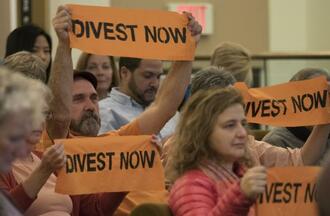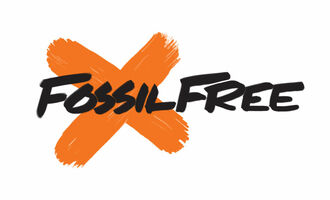-
Get University of Edinburgh to fully divest from fossil fuels and arms!Recent projections have shown that if we continue to emit CO2 at our current rates, the world will warm by a total of 4 degrees by the end of the century. It is clear that our future does not lie within fossil fuels so we must find sustainable energy alternatives before it is too late. Despite this, and despite having committed to divesting from some fossil fuel companies, the University of Edinburgh still has vast sums of money invested in fossil fuels and arms. We believe the University should stand by its ethics and join other universities such as Glasgow and SOAS in divesting fully from fossil fuels and arms companies. We are going to continue the fight and get the university to #divesttherest.19 of 100 SignaturesCreated by Megan Atkins
-
Encourage Auckland Medical School Foundation to Divest from Fossil FuelsClimate change is occurring at unprecedented rates, largely due to the massive amounts of carbon dioxide being released into the atmosphere by the fossil fuel industry. It is widely accepted that elevated carbon dioxide levels are the major contributor to the increasing global temperatures, rising sea levels, acidification of the oceans, retreating ice sheets and extreme weather events that continue to affect our planet with increasing intensity and frequency. 2014 was the hottest year in recorded history and 2015 is predicted to be even hotter. This year is also set to be another year of record global carbon dioxide emissions, a trend that has continued since the climate change performance index began in 2005. Furthermore, the global atmospheric carbon dioxide concentration exceeded the 400ppm threshold in March of this year, according to the US department of commerce national oceanic and atmospheric administration. This level demonstrates the effects of human fossil fuel usage since the pre-industrial era, when carbon dioxide concentration was 120ppm lower than current measurements. To limit global warming to a globally agreed safe level of no more than 2°C above pre-industrial temperatures, we can only afford to emit 565 more gigatonnes of CO2. We would emit 2795 gigatonnes of CO2 if we burned all the reserves already discovered, and the fossil fuel industry still invests millions in finding new reserves. The reality of taking action to reduce greenhouse gas emissions has serious financial implications for the fossil fuel industry and those invested in it. According to a report published by Hong Kong and Shanghai Banking Company, major oil and gas companies could lose up to 60% of their market value should the international community enforce existing pledges to reduce emissions. As a result of these analyses, international authorities including the International Energy Agency, the World Bank, and the International Monetary Fund have called upon investors to shift their money away from fossil fuels, we encourage the Auckland Medical School Foundation to do the same to discourage the destructive nature of the fossil fuel industry from causing further harm to our environment. Climate change has huge implications to our nation’s ecological systems and future physical and psychological health. The worsening of these environmental parameters may lead to substantial increases in climate change related diseases such as diarrheal and vector-borne infectious diseases e.g. malaria, dengue fever, as well as cardiovascular and respiratory diseases, injury and illness from extreme weather events, heat/UV radiation related morbidity and mortality, malnutrition and allergic diseases e.g. asthma. Climate change also has the potential to result in indirect deleterious effects on mental health due to stress, loss of homes, economic instability, and forced migration; with children, the elderly, and communities living in poverty being the most vulnerable. This will only widen preexisting inequalities among populations in New Zealand and around the world. We are already witnessing the impact of climate change-related extreme weather events taking their toll on, often the most ill-equipped regions of the world, and they are becoming more frequent says the United States National Academy of Sciences. Man-made climate change is likely responsible for significantly contributing to these devastating consequences. While the rise of fossil fuel use initially led to increased prosperity as well as advances in human health indirectly over the past two centuries, we are now at a cross roads. We are forced to make a decision as to whether to continue on our current trajectory, knowing full well that the costs of continued carbon emissions are simply too great bear, or we can decide to leave fossil fuels for the history books and instead adapt and advance clean and renewable energy sources which are becoming cheaper and more readily available. An awareness is spreading that economic development is no longer contingent upon fossil fuel use. By urging the Auckland Medical School Foundation to take action against climate change by publicly divesting from fossil fuel industries you will be aiding in the preservation of this Earth and its residents.42 of 100 SignaturesCreated by James Chancellor
-
Trinity College, University of Dublin, Fossil Fuel Divestment80% of current fuel reserves must stay unburned to have a significant probability of staying below the 2 degree limit of warming. However the markets place a multi trillion dollar value on this unburnable carbon reserve. Therefore, assuming effective legislation, to curb emissions and prevent catastrophic global warming, is introduced, this trillion dollar carbon bubble will burst. This means anyone who has investments in fossil fuel companies will suffer huge devaluation. Furthermore, actively investing money in the fossil fuel industry is effectively betting that we will not act to save the planet. This is an incredibly cynical position to take, one which hampers efforts to protect the climate and puts investors at risk of huge losses. As such, we believe divestment will not only be a sound decision for our institution’s financial portfolio, but also for the well being of its current and future graduating classes, who deserve the opportunity to graduate with a future not defined by climate chaos.1,940 of 2,000 SignaturesCreated by Colm Tong
-
Fossil Free Liverpool UniversityClimate Change is an issue which will disrupt our entire planet's weather and ecosystems if we allow it to happen. The effects on society will be drastic and chaotic leading to increased disease, famine, poverty, migration. We want our university be a bold leader in the fight against Climate Change and the transition to a sustainable and fairer society. The failure of the industry and global leaders over the past decades to enact meaningful change has forced the need for progressive action: divestment. The university is a leading researcher in areas of sustainable energy, environment, climate, health, food security and conflict. We want the university to have consistent values in its activities, that it will not endorse or profit from these highly unethical companies. The status quo isn't working and the transition to sustainability is inevitable so let us be bold, let us be positive, let us act on the right side of history and usher in a new better era. Divesting from these companies frees up capital to reinvest in our new technologies, industries and economies for a secure and sustainable future.302 of 400 SignaturesCreated by Fossil Free Liverpool University
-
Divest UPThe University of Portland is a great University for many reasons. One of them is that UP puts a lot of effort into being environmentally friendly and sustainable. But unfortunately the University is still investing in fossil fuels through its endowment fund. UP needs to divest, because the fossil fuel industry is everything that sustainability is not: fossil fuels are highly polluting, non-renewable, and a major cause of climate change. Fossil fuel divestment has two goals: First, it aligns actions with values. For UP, divestment would be a great next step in becoming more sustainable, a topic that is already of such high importance to the University. Second, divestment changes the public discourse on our collective energy future. It’s time for the University to take action.321 of 400 SignaturesCreated by Anne Luijten
-
Go Fossil Free!Climate change is accelerating. We are witnessing the increasing impacts of a warming planet more and more consistently; in this last year alone our country experienced record-breaking heat, droughts, and hurricanes, which impacted hundreds of thousands of people and cost our country hundreds of billions of dollars. Hurricane Sandy alone caused $50 billion in damages. Experts agree that global warming caused by humans burning fossil fuels will continue to accelerate and intensify these tragic climate disasters. The scientific consensus is clear and overwhelming; we cannot safely burn even half of global fossil-fuel reserves without dangerously warming the planet for several thousand years.14 of 100 SignaturesCreated by Tessa Owens
-
Get BP Off the University of Warwick's CampusIf it is wrong to wreck the climate, then it is wrong to profit from that wreckage. Too many UK universities support the fossil fuel industry directly through their research, their endowments and investments, and their partnerships with some of the biggest fossil fuel companies in the world, such as BP and Shell. In July 2015 Warwick committed to divest from fossil fuels (move their investments away from stocks in fossil fuel companies); the first visible sign that they agree that halting catastrophic climate change requires withdrawing support from the industry that drives it. [4] We now call on the university to demonstrate more significantly their commitment to addressing the climate crisis, and confront the rapacious industry that is intending on digging up and burning every last atom of carbon in the ground. We have chosen BP as a prime target for the University to sever their ties with, given the close connection the University has with the company. In order to have a decent chance of avoiding 2 degrees warming, the internationally recognised upper-limit for disastrous climate change, climate scientists have found that at least 4/5ths of coal, oil and gas must stay in the ground. BP is showing little sign that it intends to leave its oil reserves in the ground. [5] Climate change has been named the “biggest global health threat of the 21st century” by Lancet, one of the most prestigious medical journals in the world. [6] At a time when we need an unprecedented shift away from fossil fuel energy, BP’s chief executive received bonuses linked to the expansion of new fossil fuel projects, including the dirtiest fossil fuel of all: tar sands oil. [7] The company recently got the dubious honour of being named top of the table of European companies blocking the transition to the renewable economy. [8] Their business model is reckless, and it’s not just their contribution to climate change: BP is responsible for the largest marine oil spill in history, the 2010 Deepwater Horizon disaster. [9] The company is also being sued in a British court for alleged complicity in the kidnap and torture of a union activist in Columbia. [10] Going Fossil Free means more than just switching the University’s investment portfolio. It means taking concrete action to target and delegitimise the companies that are destroying our planet. References: [1] https://www2.warwick.ac.uk/services/library/mrc/holdings/ [2] http://www.theguardian.com/environment/2015/jan/07/much-worlds-fossil-fuel-reserve-must-stay-buried-prevent-climate-change-study-says [3] http://www.bp.com/en/global/corporate/press/press-releases/bp-announces-lord-browne-succession-plan.html [4] http://www.theguardian.com/environment/2015/jul/08/university-of-warwick-divests-from-fossil-fuels [5] http://www.rollingstone.com/politics/news/global-warmings-terrifying-new-math-20120719 [6] http://www.ucl.ac.uk/news/news-articles/0905/09051501 [7] http://www.theguardian.com/environment/2015/may/25/oil-company-bosses-bonuses-1tr-spending-fossil-fuels [8] http://www.theguardian.com/environment/2015/sep/21/bp-tops-the-list-of-firms-obstructing-climate-action-in-europe [9] https://en.wikipedia.org/wiki/Deepwater_Horizon_oil_spill [10] http://www.theguardian.com/environment/2015/may/22/colombian-takes-bp-to-court-in-uk-alleged-complicity-kidnap-and-torture282 of 300 SignaturesCreated by Connor Woodman
-
FOSSIL FREE HEC ParisThe IPCC and other scholars have estimated that to have at least a 50% chance to stay below a temperature increase of 2°C within the 21st century, we have to limit the cumulative greenhouse gas emissions between 2011 and 2050 to approximately 1.100 gigatonnes of carbon dioxide equivalent (GtCO2e)[1]. In contrast, research also discovered that global fossil fuel reserves contain 2900 GtCO2e in total, which means that at least 33% of global oil, 50% of global natural gas and over 80% of global coal reserves must remain unused in order to probably meet the 2°C target.[2] Nevertheless, oil, gas and coal mining companies continue to invest hundreds of billions of dollars per year into the exploration and production of new reserves (USD 674bn in 2012)[3], although an extensive body of research from the University of Oxford, the Carbon Tracker Initiative in collaboration with the London School of Economics and Political Science, the Chatham House, HSBC, The Economist Intelligence Unit, Kepler Chevreux, the Bank of England, and from many more renowned organisations has underlined the high and growing carbon risk embedded in fossil fuel assets[4]. These assets will lose their value before the end of their economic life (known as stranded assets) if political leaders implement stricter climate policies necessary to limit global warming to 2°C. In addition to the continuation of business as usual, fossil fuel companies engage in lobbying and disinformation campaigns to prevent climate change legislation[5].These points illustrate that the fossil fuel companies' business model and practices are fundamentally inconsistent with climate change mitigation and undermine the globally supported 2°C target. The investment in and support of fossil fuel companies to continue business as usual is neither in line with HEC's mission and values[6] nor does it contribute to climate change mitigation. If HEC Paris wants to educate and train global leaders of tomorrow to contribute to society as a whole, then HEC has to support a global legally binding climate agreement to be formulated and signed in Paris. Investments in fossil fuel companies which hold and are ready to produce a carbon-intensive asset base while pushing global temperature increase beyond 2°C are first and foremost a threat to the future of humanity and, in addition, pose a significant and urgent economic risk. References: [1] See McGlade, Ekins (2015). The geographical distribution of fossil fuels unused when limiting global warming to 2°C. Nature. Vol. 517. January 2015. [2] See McGlade, Ekins (2015). The geographical distribution of fossil fuels unused when limiting global warming to 2°C. Nature. Vol. 517. January 2015; see also Mitchell et al. (2015). Oil and Gas Mismatches: Finance, Investment and Climate Policy. Research Paper of the Chatham House: The Royal Institute of International Affairs. [3] See Carbon Tracker Initiative and Grantham Research Institute on Climate Change and the Environment, London School of Economics and Political Science (2013). Unburnable Carbon 2013: Wasted capital and stranded assets. [4] See Asnar et al. (2013). Stranded assets and the fossil fuel divestment campaign: what does divestment mean for the valuation of fossil fuel assets? Smith School of Enterprise and the Environment, University of Oxford; and See Carbon Tracker Initiative and the Grantham Research Institute on Climate Change and the Environment, London School of Economics and Political Science (2013). Unburnable Carbon 2013: Wasted capital and stranded assets; and see Mitchell et al. (2015).Oil and Gas Mismatches: Finance, Investment and Climate Policy. Research Paper of the Chatham House: The Royal Institute of International Affairs; and HSBC stated that "we believe stranding risks for assets are relatively high this year and growing." Paun et al. (2015). Stranded assets: what next? How investors can manage increasing fossil fuel risk. HSBC Global Research; and see The Economist Intelligence Unit (2015). The cost of inaction: recognising the value at risk from climate change; and Kepler Chevreux states that "USD 28trn of fossil-fuel revenues [are] at risk in a 450-ppm world"; Kepler Chevreux (2015). Stranded assets, fossilised revenues. ESG Sustainability Research; and see Carrington (2015). Bank of England warns of huge financial risk from fossil fuel investments. The Guardian Online. [5] For an overview see for instance Fossil Free MIT (2014). The Fossil Fuel Industry’s Role in Hindering Climate Change Action: Lobbying and Disinformation Against Science and Scientists. [6] See HEC Paris (2015). About HEC Paris: Mission and Values. HEC Paris website.210 of 300 SignaturesCreated by David Kampmann
-
Shippensburg University: Go Fossil Free!Climate change is accelerating. We are witnessing the increasing impacts of a warming planet more and more consistently; in this last year alone our country experienced record-breaking heat, droughts, and hurricanes, which impacted hundreds of thousands of people and cost our country hundreds of billions of dollars. Hurricane Sandy alone caused $50 billion in damages. Experts agree that global warming caused by humans burning fossil fuels will continue to accelerate and intensify these tragic climate disasters. The scientific consensus is clear and overwhelming; we cannot safely burn even half of global fossil-fuel reserves without dangerously warming the planet for several thousand years.8 of 100 SignaturesCreated by Connor Fees
-
Divest SCAD From Fossil FuelsClimate change is accelerating. We are witnessing the increasing impacts of a warming planet more and more consistently; in this last year alone our country experienced record-breaking heat, droughts, and hurricanes, which impacted hundreds of thousands of people and cost our country hundreds of billions of dollars. Hurricane Sandy alone caused $50 billion in damages. Experts agree that global warming caused by humans burning fossil fuels will continue to accelerate and intensify these tragic climate disasters. The scientific consensus is clear and overwhelming; we cannot safely burn even half of global fossil-fuel reserves without dangerously warming the planet for several thousand years.30 of 100 SignaturesCreated by Karen Briceno
-
Go Fossil Free!Climate change is accelerating. We are witnessing the increasing impacts of a warming planet more and more consistently; in this last year alone our country experienced record-breaking heat, droughts, and hurricanes, which impacted hundreds of thousands of people and cost our country hundreds of billions of dollars. Hurricane Sandy alone caused $50 billion in damages. Experts agree that global warming caused by humans burning fossil fuels will continue to accelerate and intensify these tragic climate disasters. The scientific consensus is clear and overwhelming; we cannot safely burn even half of global fossil-fuel reserves without dangerously warming the planet for several thousand years.5 of 100 SignaturesCreated by Tegan Justice
-
Divest MDC from Fossil Fuels!Climate change is accelerating. We are witnessing the increasing impacts of a warming planet more and more consistently; in this last year alone our country experienced record-breaking heat, droughts, and hurricanes, which impacted hundreds of thousands of people and cost our country hundreds of billions of dollars. Hurricane Sandy alone caused $50 billion in damages. Experts agree that global warming caused by humans burning fossil fuels will continue to accelerate and intensify these tragic climate disasters. The scientific consensus is clear and overwhelming; we cannot safely burn even half of global fossil-fuel reserves without dangerously warming the planet for several thousand years.122 of 200 SignaturesCreated by Heidi Lellelid







.jpg)




